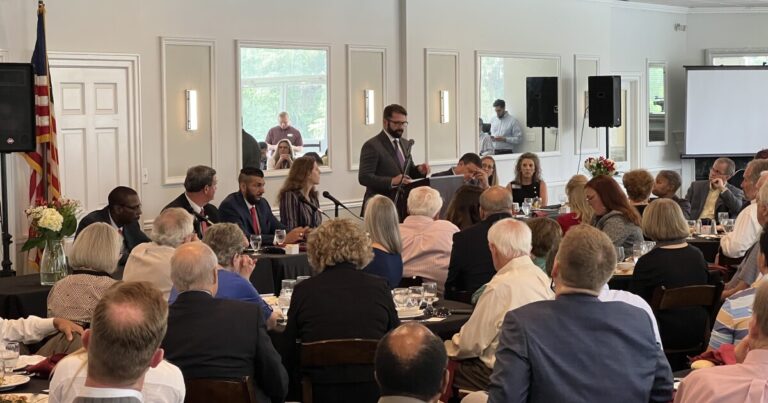
Tallahassee’s four mayoral candidates took questions from the small business community at their first debate of the election season.
The Network of Entrepreneurs and Business Advocates (NEBA) hosted the debate and luncheon at the Capital City Country Club — where about 170-180 people dined on fried chicken and listened to candidates offer their views on a range of issues, including the local economy, homelessness, crime and city ethics.
Candidates were also asked about the pros and cons of the Blueprint Intergovernmental Agency and the new Amazon warehouse opening later this year.
“How does that impact small business? We asked that question and got the answers,” said NEBA President Patrick Slevin. “That was very diverse and interesting.”
Mayor John Dailey and Leon County Commissioner Kristin Dozier are the only two candidates that hold elected office. Dailey is seeking reelection following his first term, and Dozier has served as a county commissioner since 2010. After Dozier first entered the race, Dailey went after her on Twitter for voting against certain economic development projects.
NEBA’s board wrote the debate questions, Slevin said. Afterward, the organization’s members voted for their favorite candidate. Dailey easily won the straw poll, with 65.5% of the vote. Dozier trailed him with 21%. The other two candidates at the debate are political newcomers: Michael Ibrahim and Whitfield Leland III. Ibrahim got 13% and Leland got less than 1%.
“These first-time candidates arguably they’re probably not going to get elected,” Slevin said. “But I think their voice here in this debate will carry over to whoever wins in November and becomes the next mayor.”
Both Dozier and Dailey sit on the Blueprint Intergovernmental Agency Board, a joint county-city taxing authority that’s tasked with funding infrastructure and economic development projects.
Several times throughout the debate, Dozier brought up her differences with Dailey on a controversial vote to give Florida State University $20 million for stadium repairs and renovations. “It’s a good project, but FSU could’ve had that money,” she said. “That decision went against our promise to have that money work for businesses in this community.”
Dailey defended his Blueprint vote in support of funding for FSU’s Doak Campbell Stadium. “We are a college town, and it is a partnership,” he said. “When you have a one-billion-dollar tourism budget that’s based on the higher education system, it is important for us to work together.”

Valerie Crowder
/
WFSU News
When asked about his views on Blueprint, Dailey pointed to the private development that’s followed Cascades Park, which was paid for with one-cent sales tax revenues. “It works,” he said. “I will continue to support Blueprint.”
In his first four-year term in office, the city has endured several challenges, including the pandemic, an economic downturn and a federal public corruption trial, Dailey said.
“We’ve been through a lot,” he said. “And every step of the way, you’ve had strong, steady leadership.”
But Dozier expressed dissatisfaction with Dailey’s leadership style.
“We need a mayor who is responsive to the community, who is looking for new opportunities, who is willing to work with others,” she said. “In the last few years, we have seen a mayor who is angry when we dare to question ideas in the public space.”

Valerie Crowder
/
WFSU News
Even though Michael Ibrahim doesn’t have a campaign website and hasn’t yet raised any funds, he gained 13% of the straw poll vote. Ibrahim owns Tallahassee Tire Port, an auto repair shop on Springhill Road and is originally from Egypt. Several people shook his hand after the debate. Mayor Dailey, who agreed with many of Ibrahim’s answers, even invited him to have coffee sometime.
Ibrahim spoke about the value of looking to other countries for ideas on how to solve problems like homelessness. “I’d like to bring international ideas to the table.”
He pointed to “House First” policies, which prioritize getting people into permanent housing before helping them with other issues, such as overcoming addictions and finding employment. “Finland had a huge homeless situation,” he said. “They started by building housing first for the homeless.”
Ibrahim criticized the city’s failure to house the homeless, despite having property and the funding to do more. “We are letting people go into dark places, where the only escape they figure is alcohol and drugs. And they have a lot of alcohol and drugs, crimes will happen.”
Whitfield Leland III, who often speaks out about local issues at public meetings, agreed that there is a link between homelessness and gun violence. “If you look at the individuals that are committing these crimes, they don’t have nowhere to go, they’re living from pillar to post,” he said. “That’s homelessness.”
Leland says that more funding should be invested in people serving in those nonprofit organizations.
Several candidates for other local offices were in attendance. One of them was David Bellamy, who’s challenging District 3 City Commissioner Jeremy Matlow.
“We have such a housing shortage, it would’ve been nice to hear a little bit more about the different opinions on how to fix that shortage,” Bellamy said. “You can’t have affordable housing and a housing shortage at the same time.”
Bellamy says he thinks the top two challenges facing the city are poverty and crime. The state’s poorest zip code runs from central Tallahassee to northwest Leon County. And the city’s crime rate per capita has also topped others in the state in recent years.
“That’s not a healthy city,” Bellamy said. “Our degree of poverty and our degree of crime will probably hold us back if we don’t fix it more than anything.”